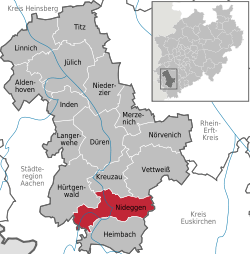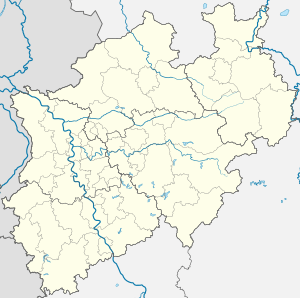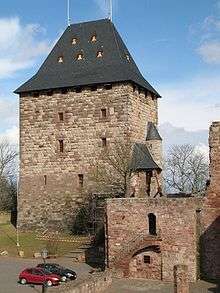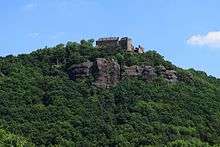Nideggen
Nideggen (German: [ˈniːdɛɡn̩] (![]()
Nideggen | |
|---|---|
Town gate - the Zülpicher Tor | |
 Coat of arms | |
Location of Nideggen within Düren district  | |
 Nideggen  Nideggen | |
| Coordinates: 50°42′N 06°29′E | |
| Country | Germany |
| State | North Rhine-Westphalia |
| Admin. region | Köln |
| District | Düren |
| Subdivisions | 9 |
| Government | |
| • Mayor | Marco Schmunkamp (Ind.) |
| Area | |
| • Total | 65.04 km2 (25.11 sq mi) |
| Elevation | 304 m (997 ft) |
| Population (2018-12-31)[1] | |
| • Total | 9,945 |
| • Density | 150/km2 (400/sq mi) |
| Time zone | CET/CEST (UTC+1/+2) |
| Postal codes | 52385 |
| Dialling codes | 02425, 02427, 02474 |
| Vehicle registration | DN, JÜL |
| Website | www.nideggen.de |

Nideggen is known for its ruined, but partly restored castle (Burg Nideggen) and the sandstone rocks along the Rur. It is twinned with Thatcham in Berkshire, England. The first mention in history was in 1184.
The town was created in 1972 by amalgamation of eight until then independent communities: Abenden (782 inhabitants), Berg-Thuir (709), Brück (301), Embken (734), Muldenau (161), Nideggen (2,983), Rath (757), Schmidt (2,974), Wollersheim (637) (December 2014). It is situated between 250 and 450 metres above sea level.
Geographical position
Nideggen lies on the river Rur and at the banks of the Rurtalsperre, the second largest dam in Germany. The region is famous for its precipitous Early Triassic rocks of Buntsandstein in the valley of Rur and is situated between 250 and 450 metres over sea level.
Museums
In the municipally-owned Nideggen Castle is the unique Castle Museum of the Rhineland. The Düren Gate (Dürener Tor), one of the symbols of the town, hosts regular art exhibitions.

References
- "Bevölkerung der Gemeinden Nordrhein-Westfalens am 31. Dezember 2018" (in German). Landesbetrieb Information und Technik NRW. Retrieved 10 July 2019.